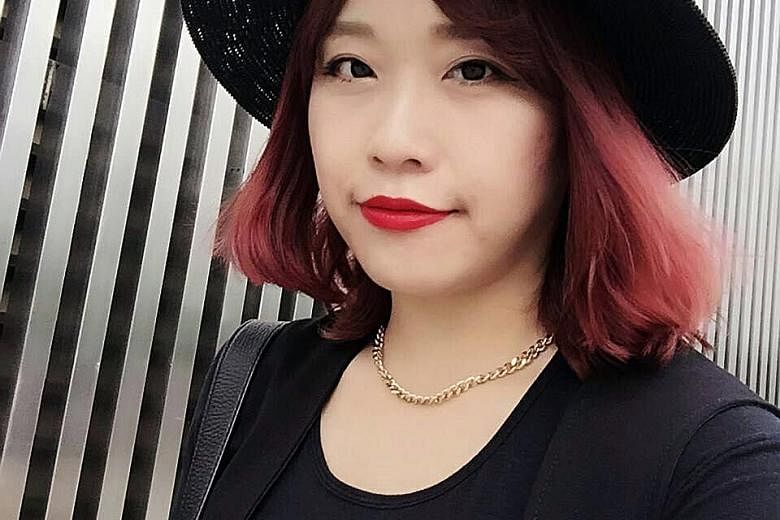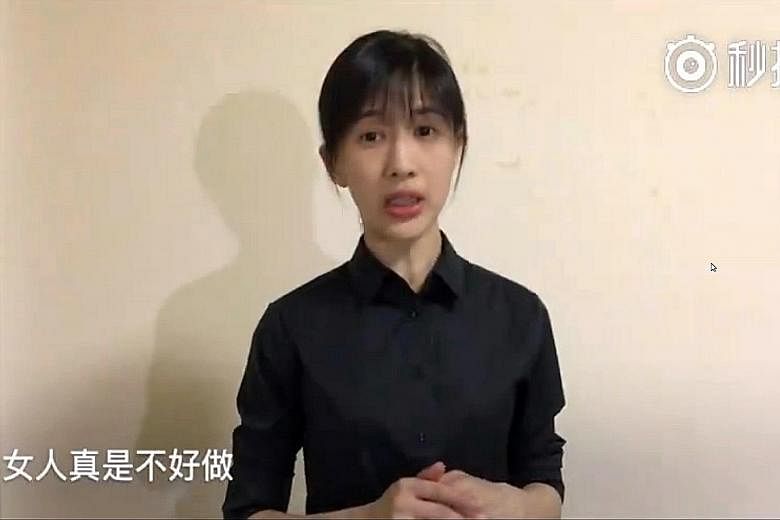Blogger Monica Xu first began writing about lipstick on social media out of personal interest in 2014, as she was preparing for postgraduate studies in fashion.
Little did she know that her hobby would grow into a business in less than a year, as more and more people started following her and liking her posts and pictures.
By the time she had 3,000 fans on social media platform WeChat, the first advertisers came knocking.
"I resisted because I didn't want to turn my hobby into a business," Ms Xu, 32, told The Straits Times. "But when my plan for studies fell through, I took the plunge."
It has turned out to be a lucrative move, as her WeChat fan base grew from 10,000 last September to 120,000 now. She now hires two other writers and charges advertisers 25,000 yuan (S$5,300) per post.
Ms Xu is part of a growing number of established and aspiring "Internet celebrities" in China who are increasingly sought by advertisers who see them playing a key role in the country's burgeoning Internet economy.
Analysts have valued China's "Internet celebrity economy" at more than 100 billion yuan, which mostly involves advertising, subscriptions and product sales.
Known as wang hong in Chinese, these homegrown celebrities create original content and advertisers want them for being opinion leaders in certain fields - such as make-up, fashion and gaming - or because of the many fans of their videos and livestreams in cyberspace.
The potential of these celebrities was highlighted last month when a Chinese online make-up retailer paid 22 million yuan for a spot on the video of Ms Papi Jiang, currently the country's hottest Internet celebrity.
The motormouth Shanghai native, whose real name is Jiang Yilei, shot to fame after finding huge popularity online with her comedy videos, which skewer, in short skits, everything from relationships to social issues, to former Chinese president Jiang Zemin.
A drama student by day, Ms Jiang, 29, has accumulated more than 13 million fans on her Weibo acount and her videos have been viewed more than 100 million times.
She is also the first Chinese Internet celebrity to receive large venture capital backing, after securing 12 million yuan in funding from a consortium of firms in March.
The Chinese are already among the most active social media users in the world, but the rise of cloud computing in recent years has allowed more content - particularly videos and livestreams - to be put online than previously, resulting in more channels and self-made celebrities.
Besides video bloggers such as Ms Papi Jiang, Internet anchors who host live webcasts have also gained popularity.
Professional bar singer Lu Ling, for instance, has been hosting a livestream online programme for the past six months, where she chats and sings for viewers, who in return can buy her gifts.
She also gets a basic salary from her artist management company Raoliangyin, which seeks out potential wang hong.
"I took on this job to make a bit of extra money," she told The Straits Times. "It's been a good experience and it's nice when people say they like my singing."
She has a regular following of about 8,000 viewers. She declined to disclose her monthly takings from her online gig but according to Chinese media reports, such anchors can make more than a few thousand yuan a month.
Fans such as Ms Zhang Yingchi, 28, like Internet celebrities because they can relate to them. "Whatever they talk about feels more real. There is a 'grassroots feel' about such celebrities," she said.
Ms Xu agreed, saying: "When movie stars endorse a product, it is different from when an Internet celebrity gives you practical advice on how to pair clothes or wear make-up."
The influence of Internet celebrities was clear during last year's record-breaking Singles' Day in China, which takes place on Nov 11.
E-commerce giant Alibaba reported US$14.3 billion (S$19.6 billion) in sales, with most of that coming from its online retail platform Taobao.
Five of Taobao's 10 best-performing shops that day belonged to Internet celebrities who started out as fashion bloggers but subsequently opened their own online fashion stores.
"The market driven by Internet celebrities in China has great potential, with the clothes sector alone estimated at more than 100 billion yuan," said a report by Guotai Junan Securities in January.
The thirst for Internet celebrities has even led to the growth of incubators dedicated to grooming aspirants, by teaching them, for instance, how to create content and be China's next big Internet star.
For advertisers, one of the biggest appeals of Internet celebrities is the ability to reach out to very specific groups of audiences, noted Ms Miranda Tan, who runs Robin8, a Shanghai-based Internet advertising platform that focuses on wang hong.
Traffic and user data allow advertisers to target different groups through the celebrities they follow, she told The Straits Times.
She believes that the spillover effect of Internet celebrities, as seen in their popular online stores and the growth of celebrity incubators, means the Internet celebrity sector has potential for continued growth.
"Many people are asking if this is a fad," she said. "But in my view, the trend is just beginning."
• Additional reporting by Lina Miao



